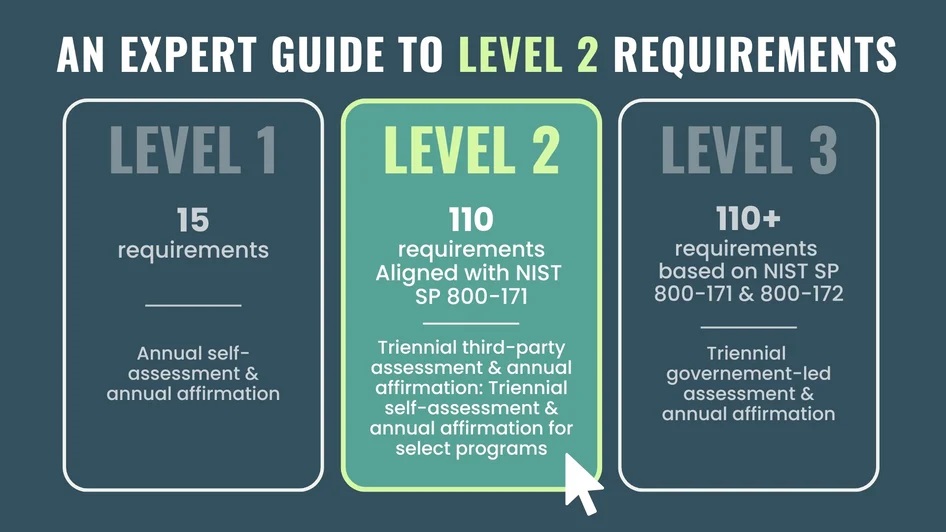Plenty of defense contractors assume they’re off the hook if they only deal with Federal Contract Information (FCI). But the fine print matters more than ever. When it comes to CMMC compliance requirements, the line between what’s required and what’s expected can shift quickly—especially if you’re working with prime contractors or handling sensitive work.
Clarifying the Threshold Between FCI and CUI for CMMC Level 2
FCI refers to information provided by or generated for the government that isn’t intended for public release. It’s important, but not as sensitive as Controlled Unclassified Information (CUI), which falls under tighter rules. If a business is sure it only handles FCI, it may think CMMC Level 1 requirements are all that apply. But that certainty is often misplaced. FCI can hide in unexpected corners, and projects can evolve, sometimes bringing CUI into the mix without clear notice.
The Department of Defense draws a clean line between Level 1 and Level 2—at least on paper. In practice, that line can get blurry. A subcontractor may start off handling basic contract details but later be asked to process or store technical data, which bumps the company into CUI territory. If that happens without a Level 2 framework in place, the business ends up non-compliant. Understanding where FCI ends and CUI begins is more than a checkbox—it’s the foundation for deciding which CMMC requirements apply.
Decoding CMMC Level 2 Standards for Purely FCI-Based Companies
At a glance, Level 2 under the CMMC framework is tied to the protection of CUI. So, if your company has confirmed it only handles FCI, CMMC Level 1 should be the requirement. But that’s not always the end of the story. Prime contractors or government customers may demand higher standards from the companies in their supply chains—even if no CUI is present.
This puts some purely FCI-based businesses in a tough spot. To stay competitive or eligible for certain contracts, they may need to demonstrate Level 2 capabilities anyway. Meeting CMMC Level 2 requirements means implementing 110 practices from NIST SP 800-171, far beyond the 17 controls required at Level 1. It’s a significant step up, but one many businesses find themselves taking to avoid losing out on contract opportunities—even if the data they touch isn’t technically classified as CUI.
Navigating Compliance Nuances for Defense Contractors Handling Only FCI
-Prime contractors may require subcontractors to meet higher CMMC levels
-FCI projects can expand into CUI without formal notice
-Self-assessments at Level 1 are easier—but not always enough
A key point many businesses miss is that even if a contract only involves FCI today, it may include CUI tomorrow. This isn’t always flagged by the contracting officer or made clear in documentation. Businesses that wait to upgrade until they receive CUI may find themselves scrambling to meet the tougher CMMC Level 2 requirements without time or budget to do it right.
Defense contractors working in dynamic environments—especially in aerospace or manufacturing—need to stay ahead of the curve. An early CMMC assessment by a knowledgeable provider helps map out not just what’s needed now, but what’s likely down the road. Level 2 readiness might not be mandatory at the moment, but it’s becoming a silent qualifier for future business.
Hidden Risks of Underestimating CMMC Level 2 Requirements with FCI
-Overconfidence in handling only FCI can lead to compliance gaps
-Level 1 controls may not meet evolving contract demands
-Not preparing for Level 2 invites penalties and disqualifications
There’s a tendency to underestimate CMMC Level 2 requirements when working with FCI alone. Companies assume they’re safe under Level 1, only to learn during a contract review or audit that more is expected. By that point, getting compliant isn’t just about security—it becomes a race against time that risks revenue and relationships.
This kind of oversight often comes from misunderstanding the evolving nature of DoD contracts. Requirements can shift mid-contract, especially when teaming with larger primes. An early investment in Level 2 readiness can prevent compliance panic later. It also builds a stronger cybersecurity posture, which makes a company more resilient and attractive to potential partners.
Why Defense Supply Chain Contracts May Push You Toward Level 2
Many smaller businesses get their DoD work through subcontracting. These primes often have their own compliance goals—and may require their subcontractors to meet Level 2 even if only FCI is exchanged. It’s not uncommon for primes to apply stricter standards across the board to simplify their own oversight and minimize risk.
If your business is part of a defense supply chain, be prepared for these pressures. Even without CUI, the expectation to meet CMMC Level 2 standards can come directly from your customer. It’s a matter of trust and accountability. Companies that can’t show a path to Level 2 may get passed over for future contracts, even if they technically meet Level 1 standards. Thinking ahead is the smart play.
Unpacking DOD Expectations for Businesses Limited to FCI
The Department of Defense makes a distinction between levels of CMMC based on data sensitivity, but their expectations are trending toward a security-first mindset. That means contractors handling only FCI can’t assume they’ll be left out of Level 2 conversations. Security across the entire supply chain matters, and that includes businesses with minimal technical access.
Understanding CMMC compliance requirements is no longer just about what’s legally required. It’s also about what your clients expect and what keeps you competitive in a shifting defense environment. A CMMC assessment isn’t just a box to check—it’s a way to identify vulnerabilities, prove reliability, and future-proof your position in the defense market. Whether you handle FCI or CUI, the time to prepare is before you’re required to act.






